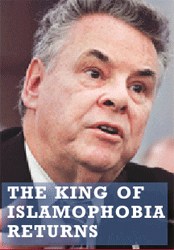WASHINGTON – House lawmakers split along party lines at a hearing Wednesday (June 20) meant to gauge Muslim responses to earlier hearings on the “radicalization” of American Muslims.

|
| Peter King |
Testimony by four witnesses was overshadowed by Republicans who defended the four prior hearings and Democrats who questioned whether they were misguided or actually harmful to American Muslims.
Short on new data but long on rhetoric, lawmakers argued both sides of the same statistics and relied heavily on anecdotes.
“The overwhelming majority of American Muslims are outstanding Americans, yet the reality is that the Islamist terror threat comes from the community,” said Rep. Peter King, R-N.Y., who chairs the House Committee on Homeland Security.
King released a report with the committee’s key findings, including the severity of the threat of radicalized American Muslims to homeland security, the presence of al-Qaeda recruitment in the country — specifically in prisons and military communities — and what the findings said was a lack of cooperation between American Muslims and law enforcement to “confront the Islamist ideology driving radicalization.”
Meanwhile, the ranking Democratic member, Rep. Bennie Thompson, D-Miss., said he hoped the hearings did not increase hate crimes or religious profiling, and worried that America’s image abroad is of a nation at war with Islam.
Thompson’s office noted that none of the three majority witnesses have law enforcement experience and all support the New York Police Department’s controversial surveillance program. Earlier this month, a group of American Muslims filed the first lawsuit challenging the NYPD’s program, which they say infringes on their constitutional rights of free speech, religion, assembly and due process.
Three of the four witnesses, all Muslims — M. Zuhdi Jasser, the president and founder of the American Islamic Forum for Democracy; Asra Nomani, a former Wall Street Journal reporter and Islamic culture instructor to the U.S. military; and Qanta A.A. Ahmed, a physician and political and religious writer — supported the hearings and said they’d opened up a much-needed dialogue within their community.
Muslim physician and writer Qanta A. A. Ahmed told lawmakers that difficulties in discussing American Islam stem from shortcomings in language, especially extreme post-9/11 rhetoric. “What’s so important about these hearings and why we actually need a synopsis of the hearings is (that) the distinction between Islam and Islamism has been lost in public discourse,” she said.

|
| Thompson |
Others argued that any religion can breed extremism. Faiza Patel, co-director of the Liberty and National Security Program at the Brennan Center for Justice at New York University School of Law, said the current model of investigating terrorist threats is ineffective because it often equates Muslim piety with extremism. describing the hearings as potential alienation of the American Muslim community.
Rep. Hansen Clarke, D-Mich., argued that the heated political discourse has resulted in discrimination beyond Muslims. He recounted an incident in his district in which a Sikh temple was defaced with anti-Muslim graffiti.
“These hearings are not an assault against Islam,” he said, his voice rising passionately. “It’s (an) assault against all Americans, especially Asian Americans,” he said.
One member of Congress likened the hearing to reality TV and talk show host Oprah Winfrey. Another grilled the witnesses on their security clearances.
Texas Congressman Al Green (D) says he wouldn’t mind Rep. Peter King (R-NY) repeatedly calling hearings on “radical Islam” if he would also conduct a “hearing on the radicalization of Christians.”
During a Wednesday House Homeland Security Committee hearing on “The Radicalization of Muslim-Americans,” Green wondered why the chairman had only focused on one religion.
“If you agree that radicalization exists within all religions to some extent, would you kindly extend a hand into the air,” Green, who is the grandson of a Christian minister, asked the witnesses testifying before the committee.
Green pointed out that he had often been mistaken for a Muslim because of his appearance.
“I do know what it feels like to look like a Muslim in the minds of some people and to be demeaned in a public venue,” he said. “I look forward to the day that we’ll have that hearing that deals with the radicalization of Christians in America.”
An analysis by Council on American-Islamic Relations of King’s first four hearings on Islamic radicalization determined that the chairman had “failed to produce the promised evidence to support his stigmatization of America’s Muslims.”
“King’s record of leveling unsubstantiated allegations and biased attacks on the Muslim community and habit of naming people with records of anti-Muslim bias as potential witnesses and information sources denies him any current credibility in discussions about American Muslims and homeland security,” the group concluded.






Leave a Reply